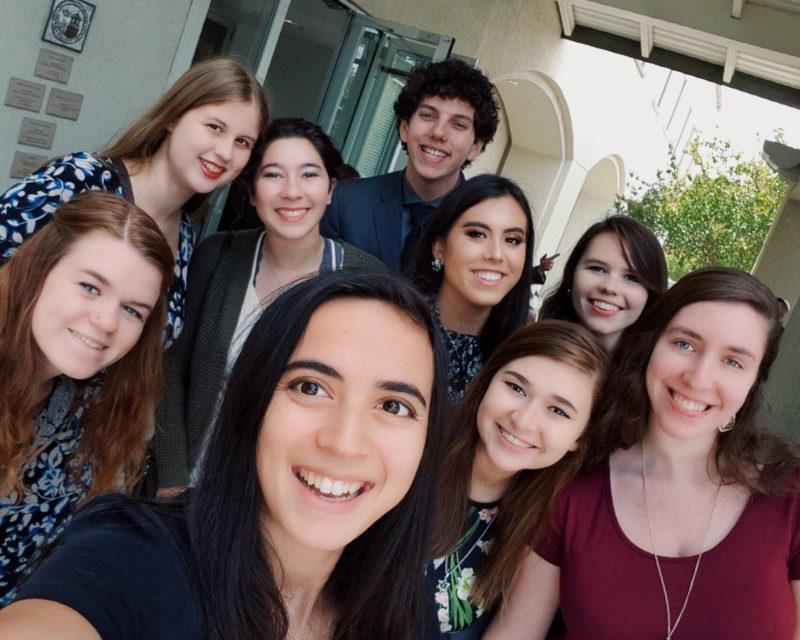Practicing Jewish students were disappointed to learn that the Cashmere Cat concert was rescheduled for Sept. 30 — the same day that they will be concluding a 24-hour period of fasting and prayer in observance of Yom Kippur, one of Judaism’s most significant holidays. Members of the Student Involvement staff have apologized to Jewish Student Association-Hillel (JSA) and are developing a policy for navigating potential conflicts between student programming and religious holidays.
Yom Kippur, or ‘Day of Atonement,’ begins when the sun sets on Sept. 29 and ends at sunset on Sept. 30, which will occur during the concert. Ruth Lavenda, a senior psychology major, has attended every Welcome Week concert during her tenure at Trinity. She’ll be skipping it this year.
“Yom Kippur is one of the biggest Jewish holidays that there is,” Lavenda said. “You fast for 24 hours, so going to a concert after fasting is probably not the safest or smartest thing to do.”
JSA is the Trinity branch of Hillel, an international organization that develops Jewish student groups on college campuses. Ashley Lachterman, junior and JSA co-president, says that it was another student, not a university official, who brought the issue to her attention.
“I felt like I needed to do something because I don’t like hearing about something like this from our members,” Lachterman said. “The administration never actually reached out to us, ever. … It got me and our board members very frustrated.”
So on Sept. 13, Lachterman explained the gravity of the scheduling conflict to Shannon Edmond, coordinator for student programs. Edmond apologized, noting that it was the only date that worked for both Cashmere Cat’s schedule and that of the university, and reaffirmed her commitment to the Jewish student community. Jamie Thompson, director of Student Involvement, followed up with a promise to minimize these mistakes moving forward.
“Sept. 30 was the day that worked for all vendors across the board: Cashmere Cat, Student Programming Board, Trinity University,” Edmond said. “What we failed to recognize was that it fell on the Jewish observed holiday, Yom Kippur. We totally dropped the ball on that one, 100 percent. We did not compare the interfaith calendar with our schedule.”
On Sept. 18, Lachterman sent an email to JSA, which has an active membership of approximately 35 students. She explained that Student Involvement had apologized and that observant Jews could rely on JSA for guidance and support.
“We understand that this concert is a special event for many of you,” Lachterman wrote. “On one hand, you first-year students may be torn in what the proper decision is here: experiencing your first large college-sponsored event with new friends, or attending services while fasting for a full 24 hours. On the other hand, our graduating seniors may want to attend their last Welcome Week concert as a Trinity student.”
Lachterman says that this is an instance of a common frustration faced by Jewish students, who remain a small, though significant, minority on campus.
“Especially for freshmen coming from home, they’re used to taking off from school for services and fasting together. But here in college, you have to make those decisions on your own,” Lachterman said. “A lot of Jews have come into a situation where they have to put their religion over whatever else.”
Instructors are required to regard religious observances as legitimate excuses for absence in class, but the university does not provide explicit guidelines for navigating religious commitments and event planning. Edmond says that such a policy is now in the works.
“We are going to try our very, very hardest not to have events on religious-observed holidays,” Edmond said. “In the case that we do, we will contact the students who are most affected ahead of time, just so they are aware of what’s going on. But that’s on the off chance. From this point going forward, we’re going to make sure that we look at the calendar and try to avoid those dates as much as possible.”
The policy will be reviewed by a committee that consists of seniors Hailey Duplantier and Lorraine Sugars as well as Nathan Tuttle, residential life coordinator, and Katharine Martin, coordinator for student-edited publications. (Martin is the Trinitonian adviser.)
Lavenda says that she would like to see university officials remain sensitive to Jewish religious obligations. University chaplain Steven Nickle agrees.
“The good news is, we’re moving to some policy. The bad news is, we’re moving to some policy,” Nickle said. “Wouldn’t it be better if we — students, faculty and staff — were attuned enough to the vitality of religious practice and the rich religious pluralism of our culture, that we knew [to think], ‘Gosh, Rosh Hashana and Yom Kippur are coming up, and for my friends who are Jewish — these are the High Holy Days!’ ”
His initial suggestion was more radical.
“One thing we could do is say, ‘This is more important to us than having a concert!’ Hate it, but we happened to have a hurricane when the concert was originally scheduled,” Nickle said.
Ultimately, Nickle and Edmond agree that this as an opportunity for education and improvement.
“I just really appreciate members of the Jewish community bringing this to our attention,” Edmond said. “I appreciate students who speak up so that these changes and policies can be enacted.”
Lachterman had the interests of other Jewish students in mind when she spoke up.
“I just want to make sure that all of our members feel comfortable on our campus, especially these new ones who are just discovering who they are in college,” Lachterman said. “I don’t want them to see Trinity as this place that attacks their religion — because it’s not.”
JSA will be hosting a “Break the Fast Breakfast” featuring movies and breakfast food after sundown on Saturday. Students interested in attending should reach out to Ashley Lachterman at alachter@trinity.edu.







